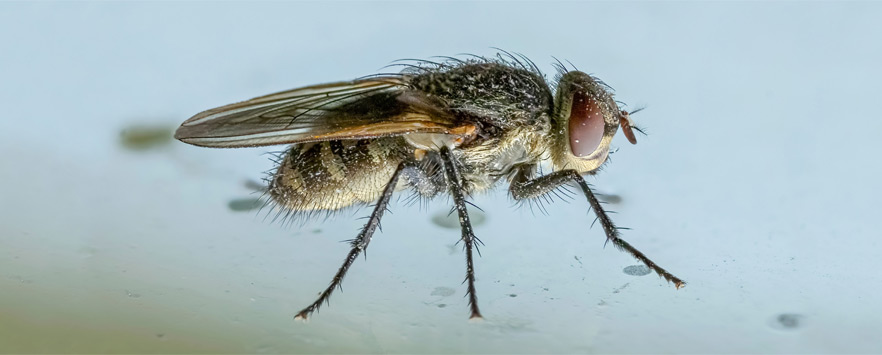Cluster Flies control
Lady Mole Catcher is also qualified to deal with cluster flies. As a professional wildlife management specialist, she has the knowledge and skills to deal with infestations as well as having access to specific insecticides which are not available to the general public.
About Cluster Flies
The common cluster fly (Polleniarudis) is often mistaken for a house fly. It is large and black but also has yellow or golden hairs on the thorax (between the head and the body) and a chequered pattern on the abdomen (stomach). They fly in a sluggish manner and can often return to the same place every autumn. Because they hibernate in winter, you may find large numbers of cluster flies gathered in your loft space or upper rooms – not very nice for the inhabitants of your home or visitors to your business!
How do you know if you have cluster flies on your property?
- Cluster flies are often found in large numbers and in upper rooms or loft spaces, ‘clustered’ around windows or undisturbed warm areas
- The insects gather in buildings during the autumn (Sept/Oct) as they get ready to hibernate for the winter and re-emerge in spring (March/April)
- Cluster flies will often return to the same property or location year after year
- Although similar to the house fly, cluster flies are slightly bigger, more yellowish in colour and fly at a slower pace
- When congregating in large numbers, cluster flies can give off a sickly-smelling odour
- Cluster flies are common in rural areas because their larvae feed upon certain earthworms found in the nearby soil
Why control Cluster Flies?
There are a few issues to consider if you discover an infestation:
- Although they do not bite, living with a large infestation of cluster flies can be an annoying and unpleasant experience
- The best way to deal with cluster fly infestations is by employing the skills of a professional controller, who can use specialist treatments to target active flies and others that may emerge after hibernation in the spring
- Most sprays available from DIY stores are ineffective against insects that are hibernating within walls and cracks
- Bear in mind that insecticides must be used with caution to prevent them coming into contact with bats, which are a protected species in the UK
- Cluster flies can squeeze into small spaces therefore fly screens are mostly redundant
- Large numbers of flies can leave behind excrement and dirt on your walls and floors

Louise Chapman BA (Hons) PGCE
Norfolk’s very own Lady Mole Catcher®
Who I work with
- Householders in their gardens
- Farmers and Land Agents
- Outdoor Leisure Facilities
- Businesses
- Restaurants and Pubs
- Schools/Colleges
- Local Authorities
If Cluster Flies are causing problems in your area, get in touch with Louise to arrange for a site survey or consultation. Call 01603 25 99 45 or 07876 14 11 53 or email louise@ladymolecatcher.co.uk

